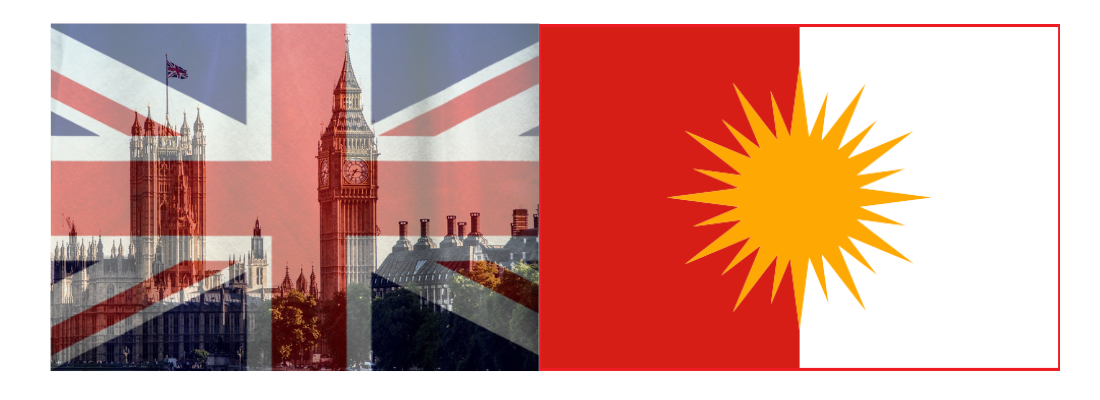IBAHRI welcomes the UK Government’s recognition of the Yazidi genocide
Thursday 3 August 2023

Image credit (for Yazidi flag): Urpunkt at English Wikipedia, CC BY-SA 3.0 via Wikimedia Commons
The International Bar Association’s Human Rights Institute (IBAHRI) welcomes the Government of the United Kingdom’s (‘the UK Government’) formal recognition, on 1 August 2023, of the atrocities against the Yazidis as genocide.
The Yazidis, a numeric minority religious group in Iraq, has been targeted by the non-state actor Daesh – also known as Islamic State, ISIL or ISIS – with the support of foreign fighters from across the world. Prohibited acts committed against the Yazidis include mass killings, serious bodily and/or mental harm, and measures intended to prevent births. Daesh has been clear that the destruction of the group is the aim of the targeting, as they consider Yazidis as infidels and devil worshippers.
Dr Ewelina Ochab, IBAHRI Programme Lawyer and lead in the UK campaign for the atrocities to be recognised as genocide, said: ‘As we mark the ninth anniversary of the attack on Sinjar [on 3 August], this is an important step that many survivors have been waiting for – the recognition of the atrocities they suffered for what they are. However, recognition alone is not sufficient. Actions must follow, including actions to ensure justice and accountability for this genocide, actions to support the communities including with safety and security in Iraq, with the return to Sinjar (when possible) and resettlement, among others. The best interest and wishes of members of the community must be central to these actions. In the UK, we must review the failures to investigate and prosecute the Daesh foreign fighters who returned to the UK. Out of over 400 returnees, only 32 have been convicted and for terror-related offences only. This is an outrageous response sending a message that if you travel abroad and participate in genocide, you can get away with it. A slap on the wrist with a few terror-related convictions is unacceptable.’
The UK Government initially refused to recognise the atrocities as genocide, relying on its long-standing policy of leaving the question to competent courts. While this policy is flawed and is not grounded in law, the UK Government did not review it despite several opportunities brought about by the Genocide Determination Bill and the Genocide Amendment to the Trade Bill debated by the UK Parliament throughout 2020 and 2021. The UK Government’s recognition only came about after three different German criminal courts convicted three Daesh members of genocide (and also crimes against humanity and other crimes) and after several campaigns led by civil society groups working with the Yazidi community, including the IBAHRI.
IBAHRI Co-Chair and Immediate Past Secretary General of the Swedish Bar Association, Anne Ramberg Dr Jur hc, commented: ‘This is a long overdue but welcome step towards justice and accountability for the Yazidis. Recognising the atrocities for what they are is a crucial element of establishing the truth and is pivotal to ensuring justice and accountability for victims and survivors. However, actions must follow. The Yazidi community now needs assistance that will enable the rebuilding and flourishing, against all odds, of their lives. With the international community having failed so dismally to protect the Yazidis, we must not now fail in our duty to support them.’
IBAHRI Co-Chair Mark Stephens CBE stated: ‘It is about time the UK recognised the Yazidi genocide for what it is. However, the issue continues that the UK does not have relevant mechanisms that would enable it to analyse and determine cases of genocide without reliance on courts. Indeed, many cases will remain unrecognised as they will never be brought to trial. This is a shameful policy and needs to be reformed as soon as possible.’
The IBAHRI has been working on the situation of the Yazidis for many years, including with the Dr Ochab-led project on justice and accountability, funded by City Law School. In February 2023, Dr Ewelina Ochab and IBAHRI Project Manager Emily Foale travelled to Iraq to meet with survivors, civil society representatives and officials to discuss the issue of justice and accountability and identify further recommendations for practical steps to be taken. The findings were published as the report, Justice and Accountability for the Atrocities of Daesh.
ENDS
Notes to the Editor
- Related material:
-
The International Bar Association’s Human Rights Institute (IBAHRI), established in 1995 under Founding Honorary President Nelson Mandela, is an autonomous entity working to promote, protect and enforce human rights under a just rule of law, and to preserve the independence of the judiciary and the legal profession worldwide.
- Find the IBAHRI on social media here:
-
The International Bar Association (IBA), the global voice of the legal profession, is the foremost organisation for international legal practitioners, bar associations and law societies. Established in 1947, shortly after the creation of the United Nations, with the aim of protecting and promoting the rule of law globally, the IBA was born out of the conviction that an organisation made up of the world's bar associations could contribute to global stability and peace through the administration of justice.
The IBA acts as a connector, enabler, and influencer, for the administration of justice, fair practice, and accountability worldwide. The IBA has collaborated on a broad range of ground-breaking, international projects with the United Nations, the European Parliament, the Council of Europe, The Commonwealth, the Organisation for Economic Co-operation and Development (OECD), the World Trade Organization, the International Monetary Fund and the World Bank, among others.
- Find the IBA on social media here:
For further information, please contact: the IBA Human Rights Institute at IBAHRI@int-bar.org
Website page link for this news release:
Short link: tinyurl.com/mr27zk7w
Full link: www.ibanet.org/IBAHRI-welcomes-the-UK-Governments-recognition-of-the-Yazidi-genocide
